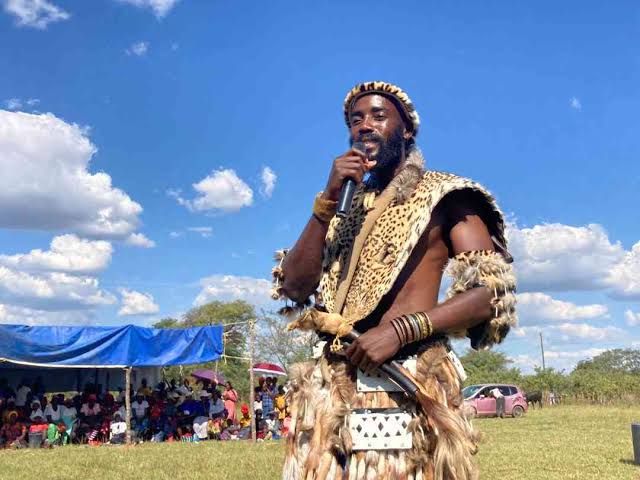Chief Dakamela Urges Collective Action for Nkayi’s Educational and Healthcare Development
Chief Dakamela, born Mbusi Bekithemba Dakamela, has called for a collective effort to fund development projects in Nkayi, emphasising the need to address the high rate of youth relocation to urban areas for better access to education and healthcare services.
Speaking during a Diaspora investment event on 10 October aimed at fostering community development, Chief Dakamela highlighted the pressing challenges facing the Nkayi community.

“Many young people from Nkayi spend most of their time here in Bulawayo to get better education and health care services,” he stated, underscoring the significant barriers that local youths face in accessing essential services.
Reflecting on his own experiences, he added, “I also learnt here in Bulawayo because secondary schools were too far and also employment opportunities are here.”
The Chief’s remarks come in the wake of a growing trend of young people leaving Nkayi for urban centres, driven by the need for better educational facilities and job prospects. This migration poses a serious threat to community cohesion and local development.
Chief Dakamela also brought attention to the deteriorating infrastructure in Nkayi, particularly the condition of local roads. “We also urge the central government to expedite the rehabilitation of our roads, as poor infrastructure is delaying the transportation of materials needed for project completion,” he said.
The Chief’s plea reflects a broader concern among community leaders regarding how inadequate infrastructure hinders progress on various initiatives.
The Nkayi community is actively seeking financial assistance to support local development initiatives. At the recent Diaspora Investment event hosted by the USAID-funded Amalima Loko program community members presented proposals aimed at improving education, healthcare, and entrepreneurship. The proposed projects include the construction of clinics, school blocks, and science laboratories, along with support for entrepreneurial initiatives such as baking, carpentry, and welding.
Local leaders articulated that these initiatives are driven by the community’s urgent need for accessible essential services.
“Early Childhood Development (ECD) learners, as well as older students, often walk long distances to reach school, discouraging some from completing their studies,” they explained.
This issue is particularly acute at Dakamela Secondary School, where the community plans to build a science laboratory to enhance the quality of science education.
The Amalima Loko program, which aims to elevate the livelihoods of more than 67,848 vulnerable households across five districts in Matabeleland North, plays a critical role in supporting these community-driven projects.
With a budget of $82.6 million, the program focuses on increasing food security, promoting nutrition-sensitive initiatives, and improving watershed management practices. These efforts are designed to create sustainable foundations for improved health and livelihoods in the region.
The funding needs for local projects are significant. Sombengo Primary School requires US$33,500 to finish an ECD block, furnish it, build staff cottages, and complete a toilet block. So far, the school has received donations including US$450, textbooks, and 20 bags of cement.
Gonye Secondary School is seeking US$23,190 to construct two classroom blocks, staff cottages, and 10 toilets. During the Indaba, the school was fortunate to receive 73 bags of cement, reading books for its library, a football kit, and US$300.
Dakamela Secondary School, which serves 252 students, needs US$57,000 to construct and equip a much-needed science laboratory. The school has already received generous donations, including laboratory stools, 5,000 face bricks, textbooks, reading materials for the library, and 10 bags of cement.
In the healthcare sector, Tsheli Clinic, which serves 3,400 villagers, requires US$28,000 to complete an outpatient ward, build staff cottages, and erect a perimeter fence. Participants at the Indaba contributed 20 bags of cement, river sand, and US$355 towards this project.
Mjena Clinic, which will serve 3,352 villagers, needs US$26,500 to construct a consulting room, treatment room, pharmacy, and six toilets to ensure operational readiness. The fundraiser has received 22 bags of cement, US$50, and an undisclosed number of bricks from an overseas donor.
Kwesengulube Clinic, intended to benefit 1,500 villagers, requires US$26,500 for the construction of an outpatient ward, staff cottages, a perimeter fence, and a borehole. So far, donations have included US$750 and 10 bags of cement.
As Chief Dakamela emphasised, these challenges require urgent attention and collective action.
“These are real challenges that we face as a community. We appeal to well-wishers to donate generously towards these critical projects,” he urged, calling on both local and international stakeholders to invest in the future of Nkayi.
#News in Bulawayo #News in Zimbabwe Artist Arts BCC Bulawayo Bulawayo City Council Bulawayo economy Bulawayo industry Bulawayo news Bulawayo Police Bulawayo Water Bulawayo Water Crisis Bulawayo Women entrepreneurship Business Women Cholera Community Culture Currency Drug Abuse Drugs Economy Farmer Farmers Farming Informal Sector Informal Traders Mining MSMEs Music News in Bulawayo News in Zimbabwe Police Police in Bulawayo Vendor Vendors water Water Crisis Water Shortage water supply issue Women entrepreneurship ZESA Zimbabwean economy Zimbabwe news Zimbabwe water crisis ZRP
Join us for all News in Bulawayo and Bulawayo News in Zimbabwe.












